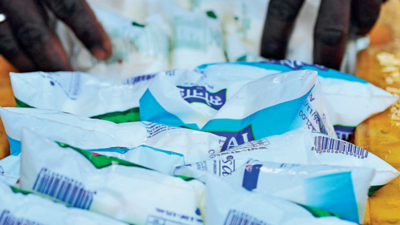Maharashtra: More dairies may hike prices as collection of milk declines

Image used for representational purpose only
PUNE: Taking a cue from Amul and Gokul, dairies that hiked their milk prices recently, other brands in the state may increase their prices in the coming weeks.
The Indian Dairy Association’s central executive committee member Chetan Narake told TOI that collection of milk has declined due to the ongoing vaccination of cattle against Lumpy Skin Disease infection, fodder costs and no surplus production of milk powder, and increase in demand across the state.
Narake, also a director of Gokul, the state's largest cooperative dairy group, said in Kolhapur district, the daily milk collection has fallen to about 22 lakh litres from around 24 lakh litres. It may further reduce in the coming days. The milk collection across the state, which is around 1.50 crore litres in the organised sector, may have dropped by at least 10%.
“The demand for milk has increased across the state as the sale of dairy-based sweets soars during Diwali. A 10% drop in the milk collection is huge, considering every year there is a rise in the milk demand by at least 5-10%, and we are not going to meet that target this year. This could lead to adulteration in the dairy-based products, especially milk and paneer, which is already being investigated by the Food and Drug Administration,” he said, adding that the increased fodder prices have also raised concerns among farmers.
Dry fodder is already in shortage and what is available is being sold at higher prices, leading to farmers being unable to fulfil the daily nutritional food quota for their cattle population. This is resulting in undernutrition of the animals, resulting further in reduced milk yield, he added.
Narake said the spread of Lumpy Skin Disease is also behind the significant drop in milk collection across the state.
“There is an inter-state ban on animal transportation. The mating has reduced, and the open grazing of the animals has also stopped in the rural areas, effectively impacting milk production. Also, after vaccination, it takes time to develop immunity, which may also impact the milk yield,” he added.
Narake said the state government should set up fodder banks at the taluka and district levels to ensure the cattle population does not remain undernourished.
The Indian Dairy Association’s central executive committee member Chetan Narake told TOI that collection of milk has declined due to the ongoing vaccination of cattle against Lumpy Skin Disease infection, fodder costs and no surplus production of milk powder, and increase in demand across the state.
Narake, also a director of Gokul, the state's largest cooperative dairy group, said in Kolhapur district, the daily milk collection has fallen to about 22 lakh litres from around 24 lakh litres. It may further reduce in the coming days. The milk collection across the state, which is around 1.50 crore litres in the organised sector, may have dropped by at least 10%.
“The demand for milk has increased across the state as the sale of dairy-based sweets soars during Diwali. A 10% drop in the milk collection is huge, considering every year there is a rise in the milk demand by at least 5-10%, and we are not going to meet that target this year. This could lead to adulteration in the dairy-based products, especially milk and paneer, which is already being investigated by the Food and Drug Administration,” he said, adding that the increased fodder prices have also raised concerns among farmers.
Dry fodder is already in shortage and what is available is being sold at higher prices, leading to farmers being unable to fulfil the daily nutritional food quota for their cattle population. This is resulting in undernutrition of the animals, resulting further in reduced milk yield, he added.
Narake said the spread of Lumpy Skin Disease is also behind the significant drop in milk collection across the state.
“There is an inter-state ban on animal transportation. The mating has reduced, and the open grazing of the animals has also stopped in the rural areas, effectively impacting milk production. Also, after vaccination, it takes time to develop immunity, which may also impact the milk yield,” he added.
Narake said the state government should set up fodder banks at the taluka and district levels to ensure the cattle population does not remain undernourished.
FOLLOW US ON SOCIAL MEDIA
FacebookTwitterInstagramKOO APPYOUTUBE
Start a Conversation
end of article









